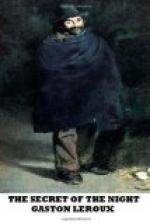to her knees and worked her way over to the window
that looked out upon the Neva. The angle of the
slanting blinds let her see well enough what passed.
outside, and what she saw made her spring to her feet.
Below her the reporter was going through the same incomprehensible
maneuvers that she had seen him do in the garden.
Three pathways led to the little road that ran along
the wall of the villa by the bank of the Neva.
The young man, still with his hands behind his back
and with his face up, took them one after the other.
In the first he stopped at the first step.
He didn’t take more than two steps in the second.
In the third, which cut obliquely toward the right
and seemed to run to the bank nearest Krestowsky Ostrow,
she saw him advance slowly at first, then more quickly
among the small trees and hedges. Once only
he stopped and looked closely at the trunk of a tree
against which he seemed to pick out something invisible,
and then he continued to the bank. There he sat
down on a stone and appeared to reflect, and then
suddenly he cast off his jacket and trousers, picked
out a certain place on the bank across from him, finished
undressing and plunged into the stream. She saw
at once that he swam like a porpoise, keeping beneath
and showing his head from time to time, breathing,
then diving below the surface again. He reached
Krestowsky Ostrow in a clump of reeds. Then he
disappeared. Below him, surrounded by trees,
could be seen the red tiles of the villa which sheltered
Boris and Michael. From that villa a person
could see the window of the sitting-room in General
Trebassof’s residence, but not what might occur
along the bank of the river just below its walls.
An isvotchick drove along the distant route of Krestowsky,
conveying in his carriage a company of young officers
and young women who had been feasting and who sang
as they rode; then deep silence ensued. Matrena’s
eyes searched for Rouletabille, but could not find
him. How long was he going to stay hidden like
that? She pressed her face against the chill
window. What was she waiting for? She waited
perhaps for someone to make a move on this side, for
the door near her to open and the traitorous figure
of The Other to appear.
A hand touched her carefully. She turned.
Rouletabille was there, his face all scarred by red
scratches, without collar or neck-tie, having hastily
resumed his clothes. He appeared furious as
he surprised her in his disarray. She let him
lead her as though she were a child. He drew
her to his room and closed the door.
“Madame,” he commenced, “it is impossible
to work with you. Why in the world have you
wept not two feet from your step-daughter’s
door? You and your Koupriane, you commence to
make me regret the Faubourg Poissoniere, you know.
Your step-daughter has certainly heard you.
It is lucky that she attaches no importance at all
to your nocturnal phantasmagorias, and that she has
been used to them a long time. She has more
sense than you, Mademoiselle Natacha has. She
sleeps, or at least she pretends to sleep, which leaves
everybody in peace. What reply will you give
her if it happens that she asks you the reason to-day
for your marching and counter-marching up and down
the sitting-room and complains that you kept her from
sleeping?”




